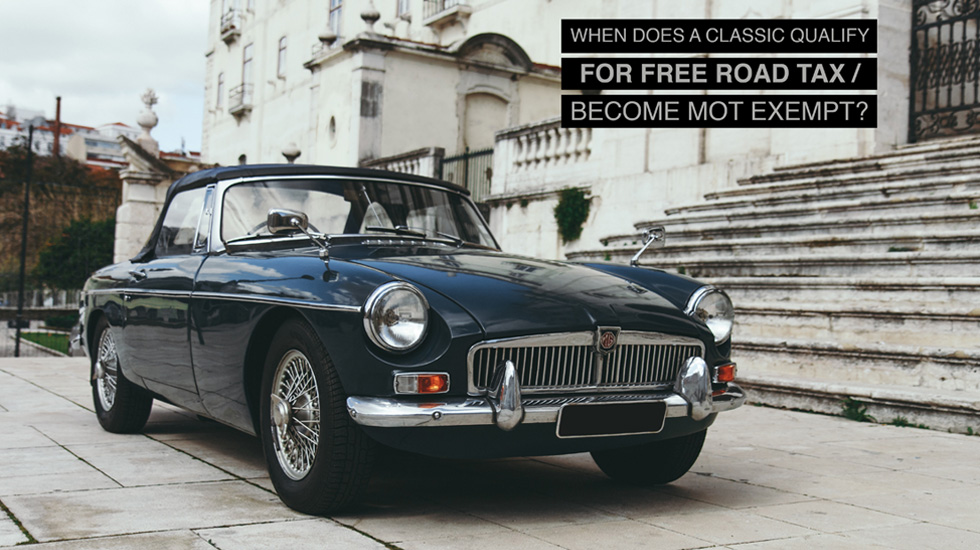
By Ian Cushway
March 27, 2018
|
When does a classic qualify for free road tax/become MoT exempt?
Here’s our easy-to-follow guide explaining when your car will be entitled to free VED and become exempt from having to have an annual check-up.
Free road tax?
Wonderful, especially if your classic qualifies for the first time this April. However, the rules as to precisely when a car is eligible to be reclassified as a Historic Vehicle can be confusing so here are some guidelines to help clarify matters…
Changing story.
Ironically, what’s created some of the confusion is the raft of rule changes. Prior to 1997 there was a rolling exemption from Vehicle Excise Duty (VED) for cars that turned 25 years old as of 1 January each year. However, the ‘rolling’ aspect stopped so only pre-’73 were exempt.
The regulations changed again in 2013, when an extra year was added to include vehicles made before 1 January 1974. Then, in 2014, came the news we had all been waiting for – exemption would be granted on a rolling basis for all vehicles made 40 or more years ago.
100% proof?
Now, tax exemption is based on the date a car was built, not when it was first registered. However, if your V5C shows that it was registered at least 40 years ago then it will become tax exempt on 1 April that year. Where the water becomes muddied is if your car was registered early in a new calendar year, as this introduces an element of uncertainty as to when it was actually made. For example, your car might have been registered in January or February 1978 – but made in late 1977. Here, DVLA has made a concession. If it was first registered within the first week of a new year (1-7 January) then it’s deemed to have been made in the previous year. If it was made after 8 January, but you still suspect it was made the year before, then you’ll need a dating certificate to prove it.
Austin, Morris, MG, Mini, Riley, Wolseley, Standard, Triumph, BMC and British Leyland owners can obtain one of these from The British Motor Museum for £42. If you own another marque, you may need to try a relevant owner’s club.
No April fool!
Okay, so assuming your car was made 40 or more years ago this year, you can’t actually apply for exemption until 1 April, so it will be a minimum of 40 years and three months old. As a guide then, a car built before 1 January 1978 will become VED exempt on 1 April this year. See, we got there in the end!
To get free road tax will need to change the classification of your vehicle from ‘Private/Light Goods’ (PLG) to ‘Historic Vehicle‘ in section 7 of your V5C as well as produce a valid MoT, V5C and dating certificate if necessary. In other words, you will still need to apply for VED but, and here’s the best bit, you won’t have to pay for it.
What about MoT?
As well as being exempt from having to pay road tax, vehicles over 40 years old will, from 20 May 2018, be exempt from MoT testing. Prior to this, only cars made before 1960 were exempt.
It needs to be classified as a ‘Vehicle of Historic Interest’ or VHI, to qualify – and for this to happen it can’t have been ’substantially changed’ from its original specification within the last 30 years. If it’s been seriously modified, then it will still need an MoT test.
But what constitutes ‘substantial change’ is a matter of some debate. Suffice to say the chassis frame, subframes and/or bodyshell must be the same as the manufacturer intended. Ditto the axles, suspension and steering. However, upgrading shock absorbers is okay, as is increasing engine capacity (within the same basic engine type), as well as swapping an engine with a beefier one originally offered in the range. The rules allow alternative parts to be fitted if the original item is not available, as well as modifications that make a vehicle safer, such as fitting disc brakes instead of drums. Changes that make a vehicle more efficient or better for the environment will also be given the thumbs up.
Keep it regular.
The more paperwork you have for your car the better, so the golden rule is never throw anything away. Keep copies of every bill, receipt and expense that relates to your vehicle then put them all in date sequence. If there’s old MoT certificates, keep them in chronological order too so you can verify your car’s mileage. If you’ve still got the original bill of sale from new or past purchase receipts, keep them safe as they all help explain a chapter in the car’s life story.
At the end of the day we want you to enjoy all the benefits of classic car ownership while still remaining safe.

Keep up with all the latest from Moss Europe on our social pages.

|
|









